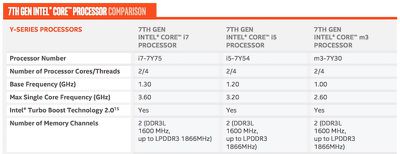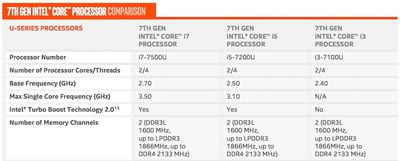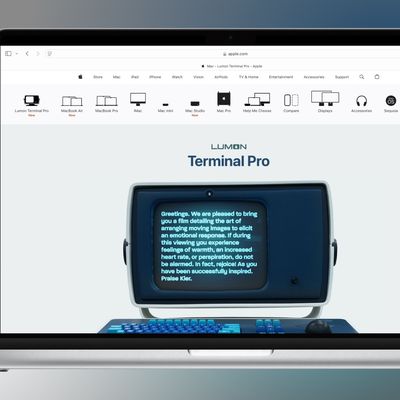After showing off the capabilities of its new 7th Generation Core, Kaby Lake, during the Intel Developer Forum earlier in the month, Intel corporate vice president Navin Shenoy today gave more details regarding the third "optimized" member of the 14 nm chip family following Broadwell and Skylake. In today's announcement -- focused on the speed and 4K UHD support the new CPUs provide -- Intel officially unveiled its first Y-Series and U-Series processors, which could be included in future Retina MacBook and MacBook Air updates, respectively.
The new Kaby Lake processors (prepared as a mid-generation update ahead of Intel's Cannonlake processors) offer a moderate upgrade on earlier Skylake chips, with Intel focusing on the user benefits of its 7th Generation Core processors. These advantages namely include: 4K ultra-HD video streaming, 360-videos, and more intensive graphical performance for video games on smaller computers.
In addition to gaining access to 4K content from services like YouTube and Netflix, Kaby Lake will grant users the power to create and edit their own 4K content with speeds up to 8x faster than a five-year-old PC. Kaby Lake was manufactured using an upgraded version of Intel's 14-nanometer process, referred to as 14nm+, which the company claims has produced a processor with 12 percent faster productivity performance and up to 19 percent faster web performance over previous generations.
Everyday users will see these manifested in smooth app switching, even within performance-heavy apps like 4K video editing software, and basic battery life improvements. In this department, Kaby Lake will bring up to 9.5 hours of playback on 4K videos in any computer it's found in this fall. The release of Kaby Lake will mark Intel's first processor released after the company abandoned its tick-tock release cycle, where "ticks" represented shrinking chip fabrication processes and "tocks" introduced new architectures.

The three Kaby Lake Y-Series processors announced today are suitable upgrades for the MacBook, which was just updated to Skylake chips in April and thus is not expected to see another upgrade in the near future. The three U-Series chips could potentially make their way into future MacBook Air models, assuming graphics performance is sufficient for Apple's needs. The new U-Series chips include Intel HD "GT2" graphics, while Apple has historically preferred to use chips with relatively higher-performance "GT3" graphics in the MacBook Air.

Apple is rumored to be launching updated MacBook Air models as soon as October, but it is unclear whether the machines will use Skylake or these new Kaby Lake chips, as the current models continue to run on earlier Broadwell chips.
More powerful mobile Kaby Lake chips with Iris graphics and desktop chips such as those appropriate for the MacBook Pro and iMac are expected to begin debuting in January, but Intel did not release a specific timeline or specs for those families.






















